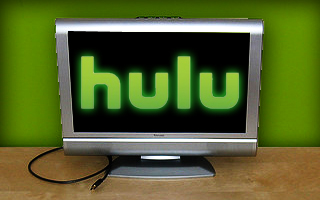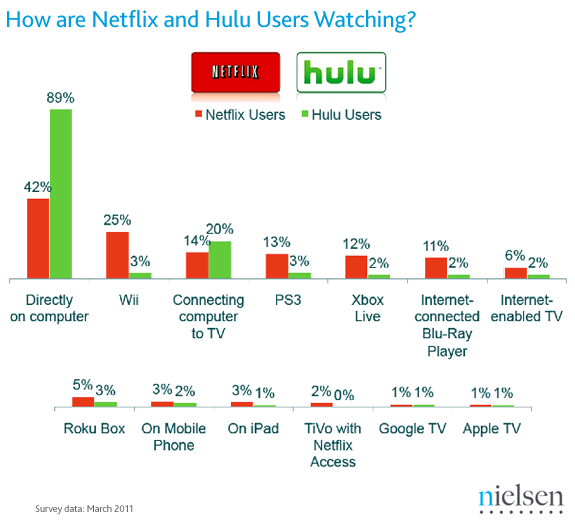 According to new stats from Nielsen, a full 89 percent of Hulu viewers say they’re watching Hulu content (mostly TV shows) on their computers.
According to new stats from Nielsen, a full 89 percent of Hulu viewers say they’re watching Hulu content (mostly TV shows) on their computers.
For comparison, just 43 percent of Netflix viewers watch from PCs, and 36 percent watch from TV-connected video game consoles. Around 15 percent watch Netflix content on Internet-connected TVs and via Roku and TiVo.
In fact, on non-computer devices (excluding TVs that are hooked up to computers), Netflix customers access more content on a wider variety of devices than their counterparts on Hulu.
So what’s locking Hulu’s customers to their computer screens? If you want a short answer, it’s “Follow the money.”
According to Hulu’s wording in that brief boilerplate for its PC-only shows, it’s not Hulu’s fault that you can’t watch Bachelorette Ashely Herbert’s search for love on your Xbox; the buck stops with the networks.
Hulu is aiming for a goal of having all content available on all devices, but licensing is done on a show-by-show basis, and negotiation results can vary.

To understand how licensing screws up your ability to watch The Bachelorette via Roku while you can watch Doctor Who on any Netflix-compatible device in the universe, it helps to start with the differences between Hulu’s and Netflix’s business models.
Free, web-only content nets Hulu a lot of money from advertisers; Netflix’s business model is entirely different and doesn’t reply on web-only licensing.
Hulu’s non-paying viewers can only watch content on the web. Access from other devices is only available if you’re willing to pay for the privilege, and currently, fewer than one million Hulu viewers are.
But even for Hulu Plus subscribers (who pay $8 each month to get more shows on more devices), some of Hulu’s most popular content, including shows like The Bachelor/Bachelorette, Pretty Little Liars and It’s Always Sunny in Philadelphia, isn’t available for viewing on non-PC devices.
As Hulu tells its users in the app, “We currently don’t have the rights to make this show available on TV or mobile devices.” That means no PS3 access, no Roku access — it’s just you, your laptop, Ashley and the bachelors on a lonely Tuesday night, unless you feel like whipping out your HDMI cable and plugging your computer into your TV.
This is where many Hulu Plus subscribers become frustrated. As one wrote in a recent blog comment, “To my dismay, after paying for 10 months, every one of my favorite shows is web-only. What am I paying for?”
The complaint is common enough that Hulu addresses it on its FAQ page, saying, “When we launched the free Hulu.com service, we obtained licensing to stream content directly to the PC and only to the PC. With the launch of the subscription-based Hulu Plus service, we had to start from scratch and acquire licensing to stream content on TVs, smartphones and tablets, as well as PCs… There are still some exceptions that we are working to resolve.”
Netflix, on the other hand, requires a subscription for all content and makes no restrictions about what kinds of devices can be used. So far, its subscriber base is around 25 times larger than Hulu’s. However, it doesn’t get any advertising money from big brands, so offering free content isn’t really a viable option, economically speaking. If Netflix offered free, web-only content, you’d likely be seeing less diversity in the devices used to access the service’s movies and shows.
So, given that Hulu makes money from subscriptions and ads on all Plus content, and given that networks could get more eyeballs for their shows if said shows were available on all devices (and could do so without losing revenue), what’s the hold-up with getting Hulu Plus shows on all supported devices?
In two words: Time and lawyers.
Hulu Plus has only been in existence for eight months, and the company is continually making new deals for distribution on new devices and distribution of new content. Currently, the service offers 2,000 TV series and 1,500 movies with access from around 100 devices. But getting the content licensed for the devices an ongoing process with networks and other content creators.
We wondered whether Hulu’s deals with NBC, ABC and Fox might not be a bit easier to negotiate (since these networks are Hulu’s owners as well as the creators of almost all the most popular TV shows on the service), but Hulu says there’s no distinction between making agreements with these three networks and other partners, which number more than 260 altogether. That makes sense, given that Hulu is getting ready to be sold, and it will need to have licensing agreements in place that are independent of whoever the company’s ultimate corporate parents are.
Why the networks are dragging their feet on a potentially universally beneficial move is anyone’s guess; we’ll be watching out for those renegotiated agreements and how they might affect Hulu Plus’ bottom line.
Image based on photo from williamhook.



